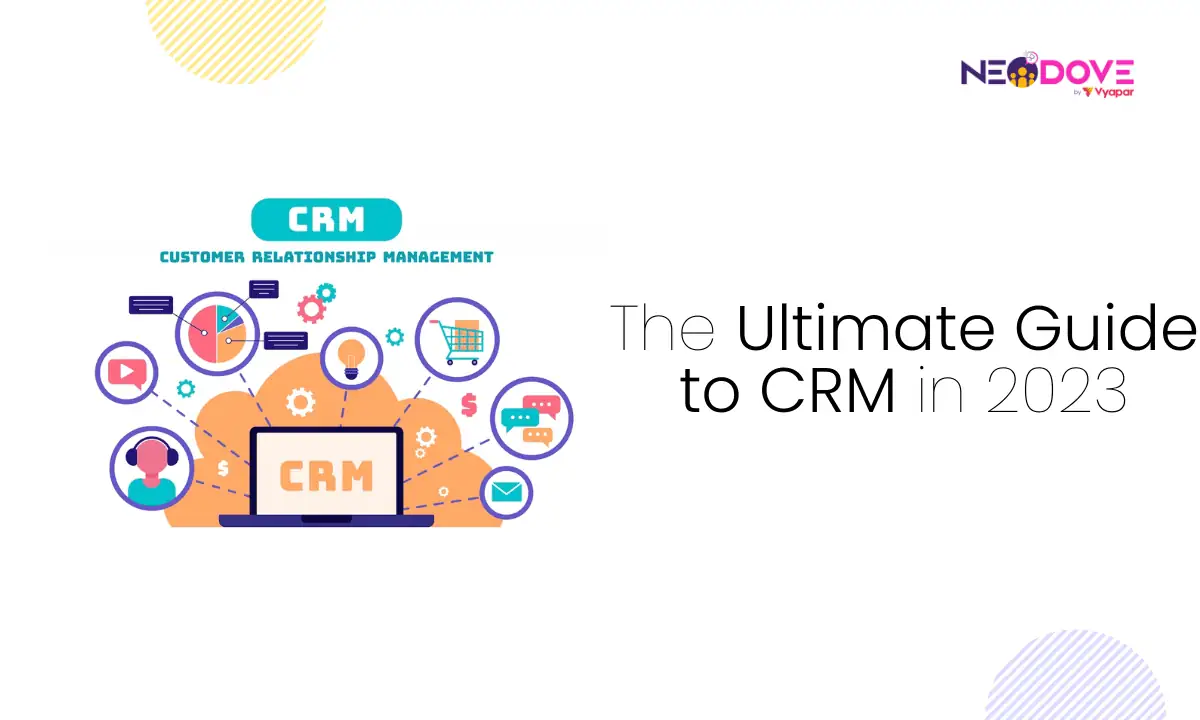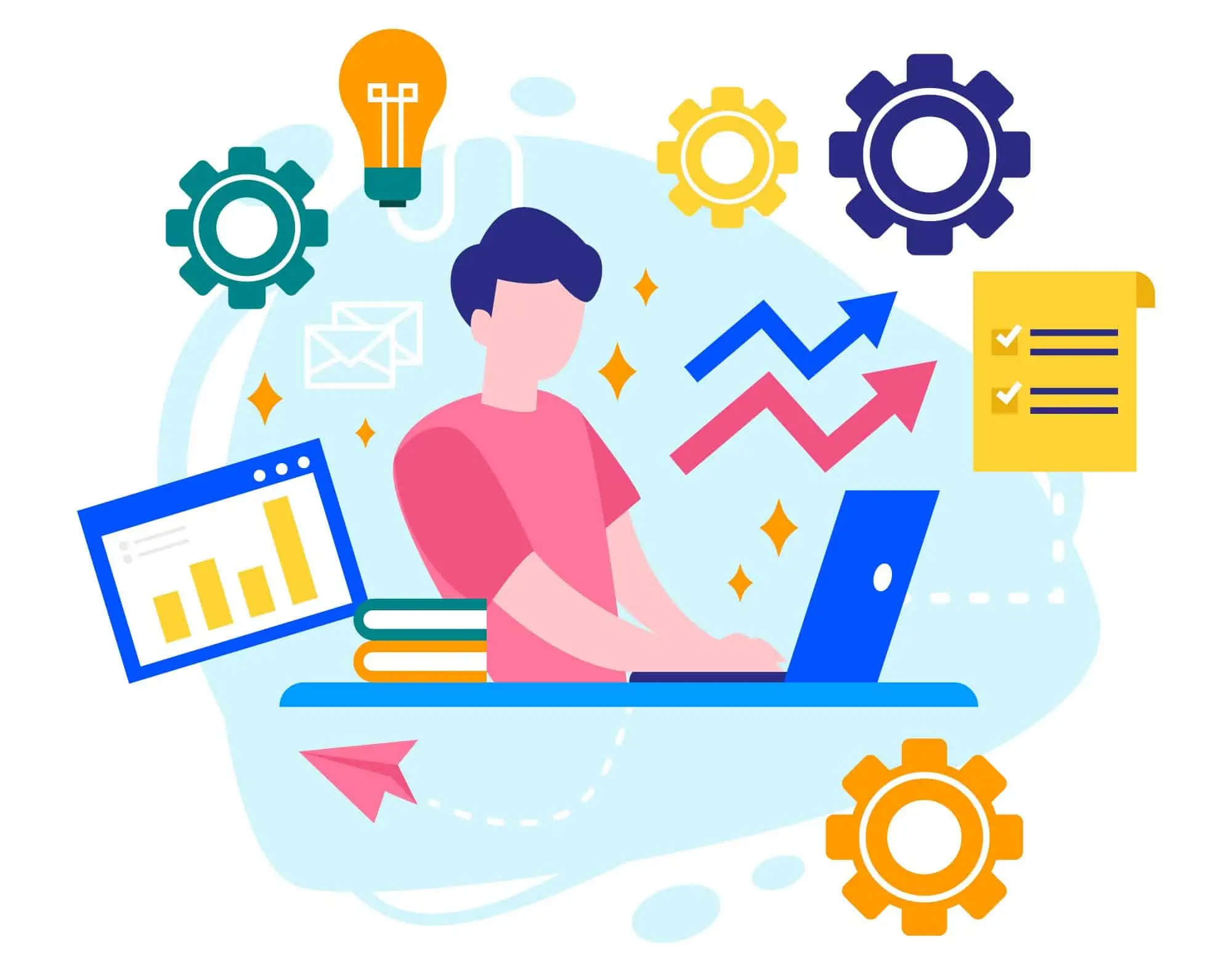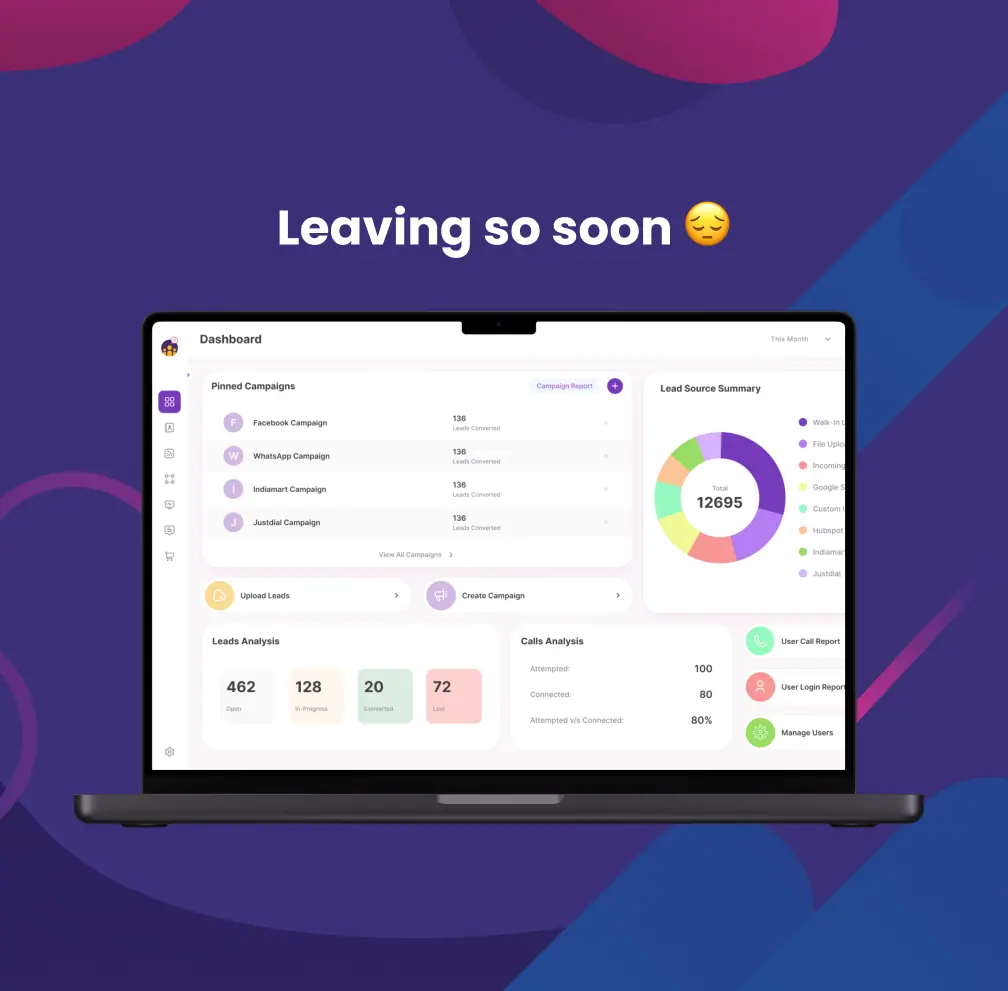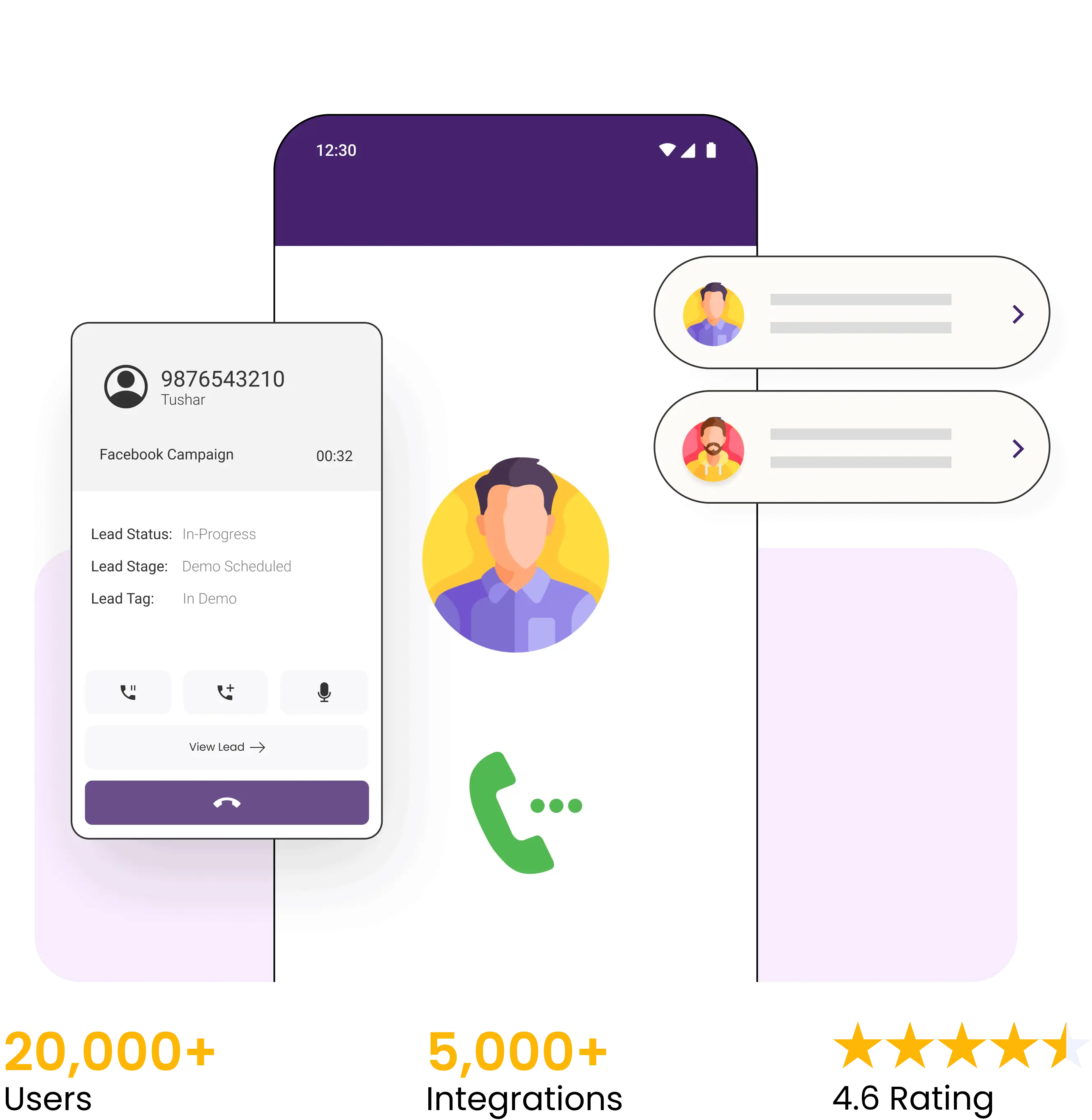FREE GUIDE
Get your copy of the ultimate guide to lead generation through telecalling (scripts included)

Table of Contents
ToggleIn today’s fast-paced business landscape, establishing and maintaining strong connections with customers is crucial for success. Whether you’re a small startup or a multinational corporation, a robust CRM system can be your secret weapon.
In this comprehensive guide, we will delve into the intricacies of CRM software. We will explore its multifaceted capabilities and uncover different types of CRM to optimize your customer interactions. We’ll explore how CRM can enhance your sales pipeline, boost customer satisfaction, and streamline your business operations.
Get ready to unlock the full potential of CRM.In this ultimate guide to CRM systems, we’ll uncover the latest trends, best practices, and innovative techniques that will drive your organization towards unrivaled success in 2023.
But before we dive in, let’s kick things off with a lighthearted joke. Why did the CRM system go on a date? Because it wanted to make a lasting impression, of course! Now, let’s get down to business and uncover the power of CRM.
Customer Relationship Management (CRM) refers to a system that businesses use for managing current as well as potential customer relationships.
The CRM system was created with the purpose of collecting and analyzing data about all the interactions between a company and its customers.
This data comes from multiple channels (for example – the company’s official online site, customer support logs, related social media channels, feedback, and online reviews, etc.) and is all stored in a centralized database.
The data collected ranges from customers include a variety of things such as contacts, notes, as well as sales activities such as calls and emails.
Furthermore, a CRM system allows for businesses to better analyze this data and utilize said data to better their products. Using the data from CRM systems , they can also address concerns of customers, as well as drive business growth.
Not only is a CRM system important for every company, but it is especially vital for small businesses that are in the early stages of growth. This is because the success of these firms depends largely on the number of customers they can gain, as well as retain.
For example, a newly opened retail store needs to know what customers think about their clothes. Are they satisfied with the clothing selection and the customer service? Are the customers likely to buy from them again? All of this information could help the store tweak its services as well as address any issues or concerns and attain maximum customer satisfaction.
Depending on the needs of your company, you have a number of CRM options to choose from.
A CRM system is an essential tool for managing a company’s customer information effectively. Moreover, it also greatly enhances the internal visibility of current operations. A CRM system also helps you keep track of potential sales opportunities on other ends of the business.
 1. Analytical CRM
1. Analytical CRMAnalytical CRM refers to CRM systems that organize and manage large amounts of data in order to gain insights into the complete customer experience.
The primary function of such CRM systems is data analysis. Not only do they support all back-office operations and analyses, but they are also responsible for managing all processes that do not directly deal with the customers.
Collaborative CRM systems are responsible for connecting communication across a business’ sales, marketing, and support departments. These systems are defined by two main aspects – interaction management and channel management.
Thus, these CRM systems allow organizations to share customer information amongst internal departments like sales, technical, marketing, and support teams. This lets them all get a better understanding of customers and their needs.
An operational CRM system focuses on automation, enhancement, as well as the overall improvement of customer interaction and support across the company.
The main purpose of these CRM systems is lead generation, converting all leads gathered into contacts, capturing all necessary information, and providing effective and efficient service to customers.
In addition to these three main categories, there are many more specific types of CRM that have been gaining popularity in the business world. Let’s take a look at some of them one by one.
A telecalling CRM is a platform that is designed particularly for the telecalling process. This CRM is tailored to have only the most essential functionalities. They are not being overly complicated like other CRMs that may have too many features that may not be very useful for the telecalling process.
This type of CRM system covers much more than just helping telecallers make calls throughout the day. These CRM systems are highly useful in effective lead management, customer engagement, performance management and so much more.
Furthermore, if telecallers need to remember every task or every follow-up, they can easily do so with the use of a telecalling CRM. Using it, the entire telecalling process is streamlined. No follow-ups are missed, key performance metrics can be assessed, leads can be managed efficiently, and so much more can be done seamlessly.
In fact, NeoDove Telecalling CRM offers a perfect demonstration of how important personalization can be in the field of telecalling. It comes with an admin portal that is meant for managers and other department leaders. It is also available as a mobile application for telecallers. Moreover, there is also a web dialer, which acts as a desktop substitute for the mobile app for teams that use regular phones.
It comes packed in with features like an autodialer and integrated lead management (1000+ integrations, including extended integrations through webhooks). This CRM system also has the feature of multichannel customer engagement through one-touch WhatsApp, Email, and SMS, real-time telecaller performance reporting, and so on.
In today’s times, mobile phones have become an absolute necessity. With the gradual rapid-paced increase in usage of devices such as smartphones and tablets, a newer form of CRM has entered the sales and marketing fields – Mobile CRM.
Mobile CRM system allows employees working in the field as well as remote employees to access customer information and records while on the go. It allows employees to work as they do on a computer, but on a smaller screen, with more intuitive menus and fewer swipes and clicks.
The best CRM software is designed keeping in mind user-friendliness and intuitive functionality, without compromising on functionality.
Also Read: Top features of a mobile CRM software
CRM systems in marketing or marketing CRM is a term that refers to strategies and tactics. Marketing CRM software also refers to the related technologies supporting the execution of said strategies and tactics, that marketers utilize in order to manage relationships with their customers throughout the customer lifecycle.
The main purpose of marketing CRM systems is to improve, as well as optimize customer relationships. As a result, this would then drive customer loyalty, retention, revenue and customer lifetime value to the business.
Marketers use this CRM software to collect information regarding first-party leads, email those leads, then move those leads through the sales funnel to purchases (or even repeat purchases).
These CRM systems typically make it easy for leads to unsubscribe to email communications, for marketers to measure the overall performance and the effectiveness of their campaigns. Moreover, they also make it easy for marketers to pass leads on to sales when those leads are ready.
With the use of CRM software, all customer interactions are stored in an organized way which makes it easy to offer them the right support. As CRM software typically supports integrations, this information can be easily transferred from various other software and modules. For example, live chat, email marketing, etc.
Support CRM systems help gain a better knowledge and understanding about customers. Since all the data related to the customers is stored in a single place, it makes it super easy for teams to communicate with customers while resolving issues. Moreover, it also saves a lot of time while simultaneously personalizing the communication.
In addition to this, it has been shown to increase customer retention. With all the information stored in the CRM system, teams can target customers in various campaigns to retain them. Furthermore, this software also provides notifications and reminders about upcoming meetings and suggests scheduling meetings with loyal customers.
Perhaps one of the most vital CRM systems, a sales CRM makes it much easier to go through the entire sales process with each customer. Not only does it help you connect with them, but you can also find out how to serve them better.
Sales CRM systems simplify the overall process of lead nurturing. With this, both administrative tasks as well as data organization are automated. So you’ll not only be able to spend less time on data entry but also be able to focus on building stronger relationships with prospective customers.
Thus, it allows you to safely store databases filled with customer information and drive more sales for the business.

Quite often, the biggest and most common challenges faced by salespeople is regarding:
1) how to qualify and follow up on leads and
2) how to prioritize sales activities.
CRM is a versatile tool that not only addresses those key concerns but also addresses a variety of other critical issues, such as:
1)Establishes a safe storage space or centralised database
2)Allows you to plan and manage your time efficiently
3)Creating and managing activity reports
4)Enables segmenting and targeting
5)Stay up-to-date on everything that’s happening
6)Schedule the time for new sales
7)Reduce production costs and increase sales revenue by strategically planning sales moves
8)Understand customers better
9)Cut down on admin tasks
10)Save money in the long run
Salespeople and CRM systems aren’t always perfectly matched. But the more time they spend together – the stronger and more powerful of a unit they become, if adopted and used correctly.
Therefore, it can be said that using a sales CRM is not only going to boost the performance of any sales team, but will also help sales teams excel in 4 areas critical for them:
1.Help perform better searches, sorting and in qualifying leads;
2.Allow them to follow up on sales opportunities systematically and on time;
3.Organizing follow-up activities and prioritizing them; and
4.Increasing target rates much faster.
Overall, CRM systems are responsible for greatly enhancing salespeoples’ productivity. This is because the database and all work-related information can be accessed on multiple devices and from different locations. Plus, CRM systems ensure all sales-related activities are carried out in a systematic and organized manner.
For all the above-mentioned reasons, that is why CRM systems are important for sales.
Read More: The importance of sales CRM for small businesses
A CRM system allows businesses to manage customer-facing voice chat, social media as well as email touchpoints all in one place. This results in efficiency throughout your business and a much better understanding of your team’s performance as well as the overall market.
Sales automation allows for the sorting of information across multiple channels and streamlines your workflow.
Lead and Contact management features collect information from multiple channels like telephone, LinkedIn, Instagram, Facebook, email and website chat. By having this information at your fingertips, you get a clearer picture of who’s who in your business as well as where they are in the sales cycle.
Account management is responsible for putting client information all in one place for easy access.
It lets you generate quick quotes as well as manage existing quotes. Quote management is an invaluable tool for forecasting sales, taking care of your business’ productional and operational needs, and categorizing your leads and customers.
Opportunity management refers to spotting potential sales opportunities as they arise, giving you the ability to act on them immediately, while proposal management tools help you manage your projects, proposals, messages, letters, and contracts.
For small businesses especially, CRM systems in sales have become quite important. In fact, it is more or less essential for sales reps, the software giving your business an edge towards achieving company set targets or KPIs.
Moreover, a CRM tool makes it much easier for the marketing team to organize their accounts, as well as track the activities of their customers.
Furthermore, CRM software stores all the customer information in a single centralized location. Thus, making it easy for all sales reps to access up-to-date information whenever they might need it.
In other words, a sales team without a CRM system is like a sports team without jerseys – incomplete. If you wish to achieve high-quality results, your sales teams should know everything about their potential customers.
In addition to this, your sales team can examine and analyze large amounts of collected customer data. Based on these analyses, you sales team can segment customers into different groups based on their preferences. For more effective sales, you can then create targeted advertisements.
For example, people who frequently post about or like posts talking about expensive cars are more likely to return to your business (if you are a car dealership). Thus, by keeping track of this customer information, you might be able to create targeted ads that will attract high-end customers.
If you are a Sales Manager and on the lookout for an efficient way to effectively manage your sales team, then a CRM system is just what you need.
CRM software helps companies manage as well as improve all their sales processes by making it as easy as possible for sales team members to manage, track, and coordinate for different prospects and customers.
Firstly, CRM streamlines sales efficiency. Not only does it enable you to streamline your business processes, but also automates everyday tasks, saving you valuable time and money.
Secondly, it greatly improves overall customer service and also gives you a 360-degree view of each customer. With so much easy to access customer information, CRM makes it quite difficult not to impress your clients.
Not only will you be able to respond faster and more efficiently, but CRM also streamlines operations in such a way that information moves seamlessly from one department to the next, giving every department access to the information they need.
In fact, CRM systems provide your team with accurate sales, marketing as well as customer service information so all departments remain in sync and organized.
Thirdly, the use of CRM drastically improves internal communication, allowing departments within a company to function as a team and improve communication between departments.
Lastly, and most importantly, CRM is a wise investment as it facilitates understanding relationships. From a managerial perspective, building relationships is certainly at the core of a powerful CRM solution.
Whether you’re managing sales, marketing or customer service, the system truly focuses on building and maintaining current as well as prospective customers’ relationships with the business.
NeoDove is the perfect CRM tool for your business due to its comprehensive features and functionalities that cater specifically to the needs of sales teams. With NeoDove, you can streamline your sales processes, improve customer service, and enhance overall productivity.
One of the key advantages of NeoDove is its telecalling CRM capabilities. NeoDove can optimize the telecalling process by providing essential functionalities without unnecessary complexities. NeoDove’s telecalling CRM enables effective lead management, customer engagement, and performance monitoring. Using NeoDove means you will miss no follow- ups and it allows for seamless management of leads and key performance metrics.
Additionally, NeoDove offers a mobile CRM solution that empowers employees working in the field or remotely. With mobile CRM, sales representatives can access customer information and records on the go. Thus, enabling them to work efficiently and effectively. The user-friendly interface and intuitive functionality of NeoDove’s mobile CRM ensure a seamless user experience. But rest assured, there is no compromising on functionality.
Overall, NeoDove is the perfect CRM system for your business because it offers specialized functionalities tailored to the needs of sales teams. With its telecalling CRM, mobile CRM, and comprehensive features, NeoDove empowers your sales representatives and optimizes sales processes. Thus, it helps you build stronger customer relationships.
As we conclude our journey through “The Ultimate Guide to CRM in 2023,” we hope you’ve gained valuable insights into CRMs. From understanding the fundamentals to exploring advanced strategies, we’ve covered it all. Remember, a well-implemented CRM system can be the driving force behind your business’s growth and success.
By leveraging the power of CRM software, you can forge stronger connections with your customers. You can enhance your sales and marketing efforts, and gain a competitive edge in today’s fast-paced market. Stay informed about the latest trends and continually adapt your CRM strategy to meet the evolving needs of your customers. With the right CRM tools and techniques at your disposal, you will surely achieve remarkable results in 2023 and beyond.
The ultimate goal of CRM (Customer Relationship Management) is to build and maintain strong, long-lasting relationships with customers, resulting in increased customer loyalty, satisfaction, and retention.
The four essential components of CRM are:




95% business who use NeoDove report 3x more profits!
Happy Customers
107k reviews

These outcomes and beyond can be yours.
Lead Leakage
Increase in call attempts
More Engagement



4.6 Rating
FREE GUIDE
Get your copy of the ultimate guide to lead generation through telecalling (scripts included)